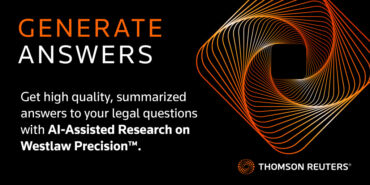Over time, legal research has made revolutionary strides. All these strides have allowed for massive leaps to have been made in legal research technology in just the past few years. The evolution of artificial intelligence has transformed the way lawyers conduct their research. Are you keeping up with the technology that can help you deliver the best work for your clients?
The question, “have I done enough?” has always been something that haunts attorneys. It’s always been a balancing act of finding the answer to that question while being efficient with billable hours. Thomson Reuters Law School Account Manager and attorney Mark Frongillo states, “The problems legal researchers are solving haven’t changed significantly in the past thirty years. What has changed are the tools they have to solve the problems”.
Maybe you don’t feel your research technology is outdated. But is it the best technology to provide high-quality service to your clients?
Here are the five signs your legal research capabilities may need an upgrade:
- Burnout due to time spent using current research methods and tools.
- Nagging doubt about your advice for clients.
- Organizational clutter due to disruptions in workflow
- Uncertainty over research thoroughness.
- A lack of confidence going into court.
1. You feel burnt out by the amount of time it takes to do your research
While pre-trial legwork remains critical, the faster you can confidently move through your search to focus on strategy and brief writing, the better. If your initial search misses relevant documents that use different language than what you entered in your search terms, you need to spend more time conducting multiple searches. Precision Research, a new feature of Westlaw Precision, reveals important case attributes, enabling you to search, filter, and browse more efficiently than before. Run a search that gathers all the potentially relevant cases, then filter your results by legal issue, fact pattern, motion type, outcome, etc.
2. You don’t feel confident you’re providing the best advice to your client
Lawyers thrive on confidence, and nothing feels worse than feeling unsure about how you’re serving your clients. It’s important that you locate and understand the law and how it applies to your legal matter – which will enable you to provide proper legal counsel and services to clients and organizations.
3. You feel unorganized
Do you have trouble building an organized outline, or do you find yourself researching and re-researching because your notes aren’t clear? If you’re using a tool like Outline Builder, you can minimize disruption to your workflow by building an outline directly within Westlaw Precision. You can open Outline Builder side-by-side with a document while researching to drag and drop important text or citations directly into your outline. For further organization in your research, Keep List/Hide Details helps you save potentially useful cases and hide cases you don’t want to inadvertently review. Your selections persist across multiple searches to make your research even more organized.
4. You feel unsure that your research is 100% correct
Even after long hours of researching, you may feel like there is more to find, or you question whether what you found is accurate. Nothing bogs down your research efforts like a nagging feeling that you aren’t finished. Precision Research not only helps you research when there is no case on point, but lets you expand your view to find cases that may be analogous ⎼ perhaps addressing the same issue in the context of a different statute or cause of action, or which involve the same fact pattern –
5. You go into court with doubts
A lack of confidence in court can jeopardize how you present your case. In every case, there is an opposing party working hard to find weaknesses in what you’ve built. Have you missed something that could provide an advantage to your client? Has the judge or your opposing counsel found something you overlooked? Those questions affect not only your confidence but your case itself. Using advanced legal technology can give you the confidence to know your research is complete.
The latest legal technology allows for new levels of speed and accuracy and can greatly improve the quality of your work – benefiting you and your clients.









